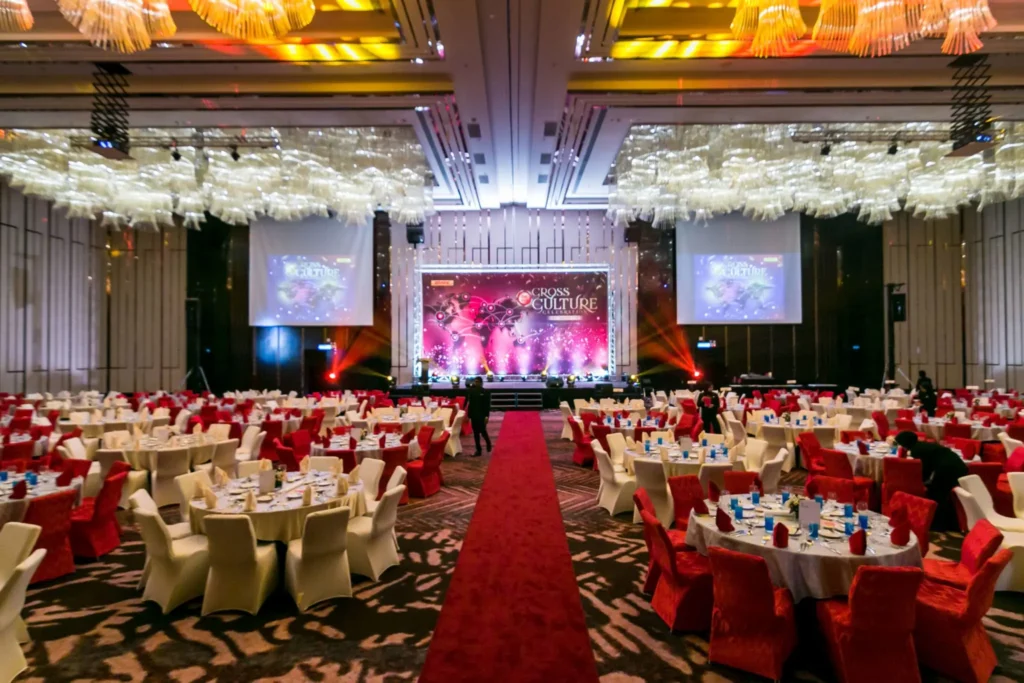When it comes to elevating your business, Corporate Event Planning in Singapore plays a pivotal role. In Singapore’s vibrant and competitive business landscape, hosting memorable and impactful corporate events is not just an activity but a strategic move to boost brand visibility, build relationships, motivate employees, and attract new clients. Whether you’re organizing a small seminar or a grand product launch, understanding the nuances of meticulous planning ensures your event achieves its desired goals and leaves a lasting impression.
In this comprehensive guide, we will walk you through every essential aspect of corporate event planning in Singapore—from setting objectives and budgeting to selecting venues, vendors, and leveraging the latest technological trends. This guide aims to demystify the process, offer practical tips, and highlight the key trends shaping Singapore’s corporate event scene today. With over 16 years of experience in delivering seamless events, we provide insights that help your organization succeed in a fast-paced, innovative environment.
1. Understanding Corporate Event Planning in Singapore
What is Corporate Event Planning?

Corporate event planning encompasses the strategic process of organizing and executing professional gatherings that serve specific business objectives. These events can range from intense corporate conferences, engaging product launches, inspiring seminars, fun team-building retreats, to elegant gala dinners. Each type of event demands a tailored approach, focusing on themes, audience engagement, logistical flow, and branding consistency.
Successful planning begins with understanding the purpose—whether to educate, motivate, network, or celebrate—so that each component aligns with your overarching goals. A well-organized event not only represents your company’s professionalism but also facilitates meaningful interactions among stakeholders, enhancing your brand’s reputation and credibility.
Benefits of Well-Planned Events
Well-executed corporate events can multiply your business impact significantly. They serve as a powerful platform for boosting brand visibility among existing and prospective clients. A memorable event leaves your audience with positive associations, strengthening relationships and fostering loyalty. Internally, engaging events motivate employees, instill pride, and enhance teamwork.
Beyond brand positioning, these events generate tangible results such as increased sales leads, partnership opportunities, and media exposure. In Singapore, where business networking is integral, an impeccably managed event can open doors to new collaborations and markets. Strategic planning also ensures resources are optimized, maximizing ROI, and elevating your corporate standing.
Key Trends in Singapore’s Corporate Event Scene
The future of corporate events in Singapore is driven by innovation and sustainability. Hybrid events combining in-person and virtual components have become a norm, expanding outreach while reducing logistical complexities. Tech-driven experiences like AR/VR and live streaming are creating immersive and engaging environments that captivate audiences.
Sustainability is increasingly prioritized, with companies adopting eco-friendly practices—such as digital invitations, minimal waste décor, and local sourcing—to align with global environmental commitments. Additionally, personalized experiences and data-driven engagement tools are helping planners craft tailored content for diverse audiences, keeping Singapore at the forefront of cutting-edge corporate event trends.
See More: How to Choose the Right Event Planner in Singapore
2. Defining Event Objectives and Goals
Why Setting Objectives is the First Step

Establishing clear objectives transforms an event from a routine gathering into a strategic business tool. This initial step guides every subsequent decision—from venue selection to program content—ensuring alignment with overall corporate aims. Defining what success looks like cultivates focus, helps in resource allocation, and provides measurable criteria for evaluation.
Without concrete goals, even the most elaborate event can fall flat or miss its intended impact. Whether aiming to increase brand awareness, foster networking, or motivate staff, articulating specific objectives provides clarity and purpose.
Common Corporate Event Goals
Corporate events are versatile, serving multiple functions across different organizational needs. They might aim to strengthen internal team cohesion during retreats, introduce new products to the market, or foster client relationships through exclusive dinners. Clearly defined goals help tailor the event format, messaging, and engagement strategies.
For example, a client acquisition event may prioritize lead generation and brand positioning, whereas an internal awards dinner might focus on employee recognition, morale, and team spirit. Recognizing these distinctions ensures every element of the event contributes meaningfully to the overall purpose.
SMART Goals Framework
Using the SMART (Specific, Measurable, Achievable, Relevant, Time-bound) framework sharpens your goal-setting process. It ensures that goals are structured, realistic, and aligned with your business operations. For instance, instead of vague objectives like “improve networking,” a SMART goal would be “generate 50 new sales leads through the event within three months.”
Employing SMART goals streamlines planning and evaluation. Post-event, these criteria facilitate accurate assessment of success, allowing you to refine future strategies based on concrete data and insights.
Creating a Master Plan
Following the formulation of goals, developing a detailed master plan is essential. This involves mapping out timelines, key milestones, task responsibilities, and contingency plans. Breaking down complex projects into manageable phases—including pre-event, on-site, and post-event activities—ensures smooth execution.
A master plan acts as the blueprint of your event, maintaining focus and momentum. Regular progress reviews and updates keep all stakeholders aligned and ready to adapt to unforeseen challenges, ultimately elevating your event’s professionalism and effectiveness.
See More: Event Organiser Singapore: Your Premier Partner for Unforgettable Events
3. Budgeting and Financial Planning

Estimating Costs
Financial planning is a pillar of successful event execution. The size, scale, and sophistication of your event dictate costs across multiple categories:
- Venue: Small spaces like private function rooms may start from S$1,000, while major convention centers like Marina Bay Sands can exceed S$50,000.
- Catering: Food and beverage expenses typically range from S$50 to S$200 per person, depending on menu complexity and service style.
- AV Technology: High-quality audio-visual (AV) setup, live streaming, and interactive tech can cost between S$3,000 and S$8,000 or more.
- Entertainment: Engagements such as keynote speakers, performers, or emcees might range from S$1,000 to S$10,000 depending on profile.
- Décor Styling: Creative décor, signage, and stage design can vary from S$1,000 to S$7,000+.
Additional costs such as staffing, logistics, marketing, and promotional materials should also be factored into your total budget. Being comprehensive and realistic early on prevents overspending and ensures all elements receive adequate attention.
Cost-Saving Tips
Budget constraints are common, but strategic choices can optimize spending. Early booking secures better rates and availability, especially during peak seasons like year-end or Chinese New Year. Negotiating with preferred vendors or bundling services can also lead to discounts and added value.
Leveraging hybrid formats reduces venue and travel expenses, expanding accessibility without sacrificing engagement. Sourcing local talents and suppliers minimizes costs while supporting the local economy. These approaches allow you to deliver a high-impact event without compromising quality.
ROI Measurement
Assessing your event’s success extends beyond attendance numbers. Key performance indicators (KPIs)—such as engagement levels, new leads, media coverage, and sales conversions—offer a comprehensive view of ROI. Post-event surveys gather attendee feedback, revealing insights about satisfaction levels and areas for improvement.
Analyzing data collected during the event helps evaluate whether your objectives were achieved. This process is essential for refining future event strategies, demonstrating value to stakeholders, and securing continued investment in high-quality corporate events.
See More: Top 30 Event Management Company Singapore to Elevate Your Next Event
4. Choosing the Right Venue in Singapore
Popular Venue Types
Selecting an appropriate venue is critical to setting the tone and accommodating your event’s needs. Singapore offers a diverse portfolio:
- Hotel Ballrooms: Iconic venues such as Marina Bay Sands or The Fullerton Hotel provide luxurious spaces with dedicated event services.
- MICE Venues: Large-scale venues like Suntec Singapore, Sands Expo, or Singapore EXPO are ideal for conventions, trade shows, and exhibitions.
- Unique Venues: Rooftop gardens, heritage sites, art studios, or open-air spaces offer memorable environments that reinforce your brand story.
- Co-Working Spaces: Trendy and flexible, co-working venues like The Working Capitol or HUB Singapore are suitable for intimate workshops, seminars, or startup showcases.
Each venue type offers distinct advantages based on your event size, theme, and budget. Balancing exclusivity and practicality ensures your venue choice enhances overall attendee experience.
Factors to Consider
When evaluating options, consider capacity requirements, accessibility via public transportation, and available amenities—including parking, Wi-Fi, and AV support. The venue’s ambiance should align with your branding and theme, creating the right atmosphere for your event.
Booking during peak seasons demands early planning, as venues tend to fill up quickly. Additionally, assess technical compatibility and service quality. Visiting venues beforehand helps identify potential logistical challenges and personalize arrangements to meet your specific needs.
Top Recommended Venues
For smaller, corporate meetings or workshops, boutique hotels or innovative co-working spaces offer intimacy and style. Larger-scale events benefit from iconic venues like Marina Bay Sands or Suntec Singapore, which provide extensive facilities and technical support.
Singapore’s rich tapestry of venues helps tailor events to any business size or industry, ensuring memorable experiences that reflect your company’s vision and values.
5. Selecting Vendors and Partners
Event Planners Agencies
Partnering with experienced event planners can streamline complex logistics and ensure professionalism. These specialists bring valuable industry insights, vendor relationships, and crisis management skills. When choosing an agency, look for a track record of success, flexibility, and understanding of your industry.
A reliable event partner helps conceptualize themes, manage timelines, and coordinate all logistical elements seamlessly. Their expertise often results in cost efficiencies and innovative ideas that elevate your event.
Catering Services
Catering is more than just food; it shapes attendees’ overall perception. Emphasize diverse, health-conscious menus that cater to dietary restrictions, and consider fusion cuisines that reflect Singapore’s multicultural identity.
Sustainable catering options—such as locally sourced ingredients and eco-friendly packaging—align with corporate social responsibility goals. Experienced caterers also handle logistics, timing, and presentation, ensuring a smooth dining experience.
Audio-Visual Technical Support
AV and tech support are vital for creating immersive experiences. Top-tier lighting, high-quality sound systems, and reliable live streaming capability ensure flawless delivery, especially in hybrid or virtual components.
Choosing vendors with expertise in the latest conferencing technology, interactive installations, and real-time streaming makes your event more engaging and accessible to a wider audience.
Entertainment Guest Speakers
Engaging emcees, inspiring speakers, or talented performers help convey your message and keep audiences captivated. Carefully select personalities aligned with your event’s tone, whether motivational, educational, or celebratory.
Booking credible talent with relevant expertise and a strong stage presence enhances your event’s professional image, encourages networking, and fosters meaningful conversations.
See More: Comprehensive guide to hiring an event organizer in Singapore
6. Event Design and Program Flow

Crafting an Engaging Theme
A compelling theme ties together your entire event, creating a cohesive narrative that resonates with your audience. It should reflect your brand identity, the event’s purpose, and the audience’s interests. Incorporate visual elements, messaging, and décor that reinforce the theme to leave a consistent impression.
A well-developed theme generates excitement, encourages participation, and elevates the overall experience. Consider interactive components—photo booths, themed décor, and branded merchandise—that foster engagement and social sharing.
Agenda and Schedule Planning
A balanced schedule prevents fatigue and maintains energy levels. Incorporate keynotes, breakout sessions, interactive activities, and networking opportunities strategically. Short, dynamic segments with variety and audience interaction make the program memorable.
Timely breaks, refreshment periods, and entertainment segments provide natural transitions and social opportunities. Clear timing and coordination are crucial for a seamless flow that respects attendees’ time and maximizes value.
Branding Opportunities
Every touchpoint—from signage and stage design to event giveaways—can reinforce your brand message. Creative signage or interactive backdrops offer excellent photo opportunities, boosting social media exposure.
Leveraging custom-branded merchandise, lanyards, and digital assets ensures consistent branding and memorable takeaways that keep your company’s image top of mind long after the event concludes.
7. Marketing and Promotion of Corporate Events
Pre-Event Promotion
Effective marketing builds anticipation and guarantees high attendance. Utilize social media channels, email campaigns, and press releases tailored to your target audience. Collaborate with influencers or industry stakeholders to extend your reach.
Creating compelling content—teasers, behind-the-scenes sneak peeks, or speaker highlights—engages potential attendees. Early registration incentives, such as discounts or exclusive access, stimulate sign-ups and set a positive tone.
Event Registration Tools
Choosing the right registration platform simplifies guest management. Platforms like Eventbrite, Cvent, or Peatix offer user-friendly interfaces, ticketing options, and analytics that streamline the process and provide valuable data for post-event reporting.
Utilizing customized registration pages and automated confirmation emails improves attendee experience, reduces administrative burden, and provides insights into attendee demographics.
During Post-Event Engagement
Live social updates, dedicated event hashtags, and real-time polls foster engagement and social sharing during the event. Post-event surveys quickly gather feedback on satisfaction levels, content relevance, and overall experience.
Creating highlight reels or recap videos consolidates memorable moments, amplifies your event’s visibility, and nurtures ongoing relationships. Consistent engagement keeps your brand top of mind and drives future participation.
See More: Top Event Management Company Singapore – Complete 2025 Guide
8. Technology in Corporate Event Planning
Event Management Software
Adopting event management solutions—such as scheduling, ticketing, and attendee tracking tools—enhances efficiency. These platforms facilitate seamless registration, check-in, and data collection, enabling real-time analytics for on-the-spot adjustments.
Advanced software also supports session scheduling, speaker management, and post-event reporting, turning complex logistics into streamlined workflows that free your team to focus on content and engagement.
Virtual and Hybrid Events
Virtual platforms broaden your reach and offer flexibility. Live streaming services, webinar integrations, and hybrid conference tools allow participants to join from anywhere, increasing audience scope and participation.
Integrated solutions like Cvent’s hybrid event platform combined with high-quality streaming equipment ensure your virtual attendees experience a seamless, engaging participation akin to in-person attendance.
Audience Engagement Tools
Interactive apps, live polls, QA sessions, and gamification strategies heighten attendee involvement. These tools collect live feedback, foster networking, and foster a fun, memorable environment.
Technology that personalizes the experience sustains attendee interest and provides valuable data to tailor future events, keeping your corporate events innovative and relevant.
9. Legal, Compliance, and Safety Considerations
Permits and Licensing
Navigating Singapore’s regulatory landscape is crucial to avoid legal complications. Use resources like the GoBusiness Singapore e-Adviser to secure necessary permits, including notices of intention for public events, public entertainment licences, and temporary fair permits.
Early compliance not only ensures legality but also demonstrates your professionalism and respect for local regulations. Staying updated on post-pandemic health protocols and safety standards is equally essential.
Safety and Health Standards
Post-pandemic safety measures include crowd control, sanitation, contactless registration, and emergency response plans. Conduct venue risk assessments and ensure compliance with SCDF (Singapore Civil Defence Force) standards.
Adhering to safety guidelines reassures attendees and builds trust. Consider hiring safety officers or coordinators to oversee protocols during the event, especially for larger gatherings.
Data Privacy and Protection Laws
Respect attendee privacy by managing personal data responsibly in line with Singapore’s PDPA (Personal Data Protection Act). Obtain consent for data collection, secure digital information, and outline clear data usage policies.
Transparent communication regarding data handling fosters trust and demonstrates your company’s commitment to legal compliance and responsible management.
10. Measuring Success and Gathering Feedback
Post-Event Surveys
Surveys are vital for evaluating attendee satisfaction and gathering actionable insights. Tools like Google Forms or SurveyMonkey facilitate easy distribution and analysis.
Questions should cover content relevance, venue experience, networking opportunities, and overall satisfaction. This feedback guides improvements and highlights strengths to replicate in future events.
Key Metrics to Track
Measuring attendance, engagement levels, lead generation, social media activity, and ROI provides a comprehensive view of your event’s success. Tracking these metrics helps quantify impact and justify future investments.
Analyzing data such as session popularity, app usage, and post-event conversions reveals attendee preferences and content effectiveness. Data-driven insights enable smart planning and continuous enhancement of your corporate events.
Continuous Improvement
Post-event debriefs with your team and vendors are essential to identify lessons learned. Discuss what worked, what didn’t, and possible enhancements. Documenting these insights ensures each event is better than the last.
Implementing feedback and refining your planning process elevate your brand image, increase ROI, and contribute to long-term success in Singapore’s competitive corporate landscape.
Conclusion
Effective Corporate Event Planning in Singapore is both an art and a science, requiring strategic foresight, meticulous execution, and adaptability to technological advancements and evolving trends. From defining clear objectives and managing budgets to selecting suitable venues and vendors, every aspect plays a vital role in creating a memorable experience that aligns with your organizational goals. Embracing innovation, sustainability, and data-driven insights ensures your corporate events stand out in Singapore’s dynamic environment. Partnering with a dedicated event company, leveraging the latest in event technology, and maintaining compliance are key steps toward excellence. Whether celebrating milestones, launching new products, or strengthening corporate relationships, thoughtful planning and execution will set your organization on a path to success. Partner with experienced professionals in Singapore who understand the intricacies of the local market and can turn your vision into reality—making every event an unforgettable story told one occasion at a time.